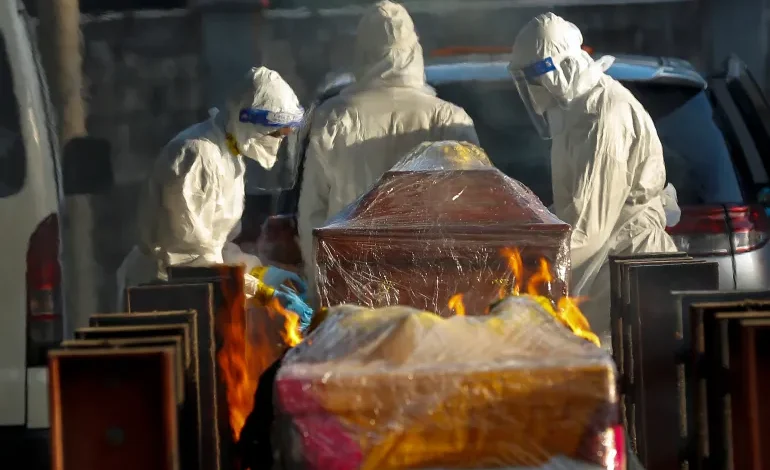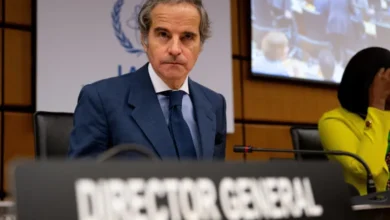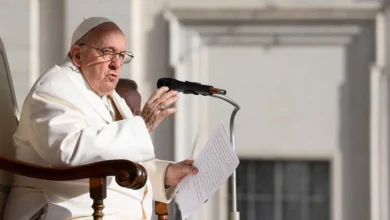Three years later: Lives reshaped by COVID-19

Three years ago this day, the coronavirus outbreak was declared a pandemic, a once-in-a-lifetime event that tested the limits of humanity.
Societies in lockdown, untold numbers of people hospitalised, school closures, jobs lost and the death of loved ones became routine in the lives of billions of people.Farath Shba, Singapore
Zaheer was only 18 months old when he succumbed to COVID-19 in June 2022, becoming the first reported death from the virus of a child below 12 years in Singapore.
After recording a temperature of nearly 40 degrees Celsius (104 degrees Fahrenheit) in the first few days of catching COVID, Zaheer’s condition worsened.He suffered from violent seizures and was diagnosed with meningoencephalitis – a condition that leads to an inflammation of the meninges membranes and brain tissues. Zaheer was eventually placed on life support after doctors pronounced his brain non-functional.
“In life sometimes you think you could have done better. I feel that when it comes to Zaheer’s passing. I still feel the anger,” Zaheer’s father Farath Shba, holding back tears, told Al Jazeera from Singapore.
“That was very traumatising … I was not ready to let him go. Everyone told me to give up or get prepared for the worst but I simply could not,” Shba said.
Zaheer’s older brother Zayan, who is still a toddler, would constantly ask about him, their father said.
Then on June 27, little Zaheer took his last breath.
“Nothing prepares you for the loss of a child,” Shba said.
“The first month or so was very difficult. My wife would wake up at night crying loudly … this happened for weeks,” he said.
Zayan too was overcome with sadness when he found out his little brother was not coming home.
“He was very protective of him … he thought we had done something bad to him. He would start hitting me and my wife.”Nine months later, Shba says, the family has started to move on.
“We have not forgotten Zaheer. I still pray at his grave once a week,” the account manager revealed.
Moreover, Shba says he avoids talking to Zayan about Zaheer, whose memories of his young brother have started to fade somewhat.
“When he matures a bit, I will explain it to him. But for now, I avoid bringing up his brother’s name,” he said.
Ana Gruszynski, Brazil
Ana Gruszynski says her life changed forever from the moment her 87-year-old mother was hospitalised with COVID-19 in August 2020.
After her mother passed away from the virus, Gruszynski – who took care of her during that time – tested positive five days later, leading to pneumonia, neuropathy issues and skin rashes.
She is now one of the millions of people suffering from the condition known as long COVID, a set of illnesses that may last weeks, months or even years for those who have caught coronavirus.
While her pneumonia subsided a few weeks after she contracted COVID-19, Gruszynski said she soon started to develop vertigo – a condition defined as having “a sensation of feeling off balance”, and can lead to nausea, vomiting and eyesight issues.
“If I got on an online video session to teach or using my phone, I could not see properly … I would get very dizzy,” she said. “I thought maybe it was just stress since my mother just died, but the symptoms only got worse.”
A professor at the Federal University of Rio Grande do Sul in Brazil, Gruszynski said while she was battling vertigo, she was also diagnosed with polyneuropathy – a condition that affects a person’s peripheral nerves, skin and muscles.
“Taking a shower felt terrible,” she said.
“It hurt to put clothes on. I had to buy a special pillow and foam [to sleep]. It was really awful.”
Her condition became so bad that she was forced to take time off from teaching in 2021 as she sought medical attention.Eventually, after more than a year of trying multiple remedies, Gruszynski was recommended medical marijuana to help with her symptoms, which she said made a huge difference.
But her symptoms have not gone away fully.
“If I walk too fast, or if the weather is too hot, I get tachycardia symptoms,” she said.
In July, the 56-year-old said she decided to take early retirement from her position at the university.
“I already had a desire to retire before COVID … but even [if] I wanted to continue, I couldn’t afford to,” she said. “I have difficulty concentrating and am slower to perform tasks, which is incompatible … with work demands of university professors.”









